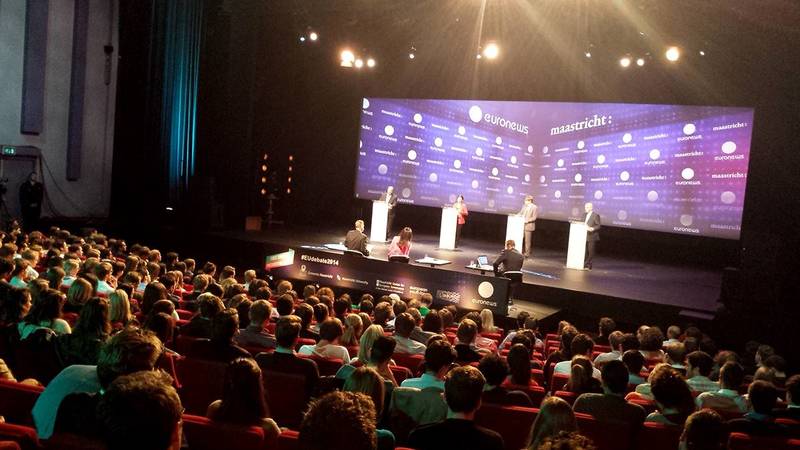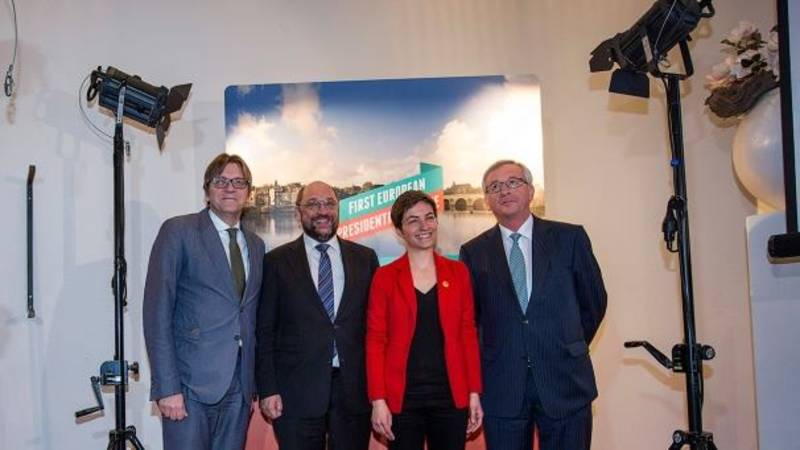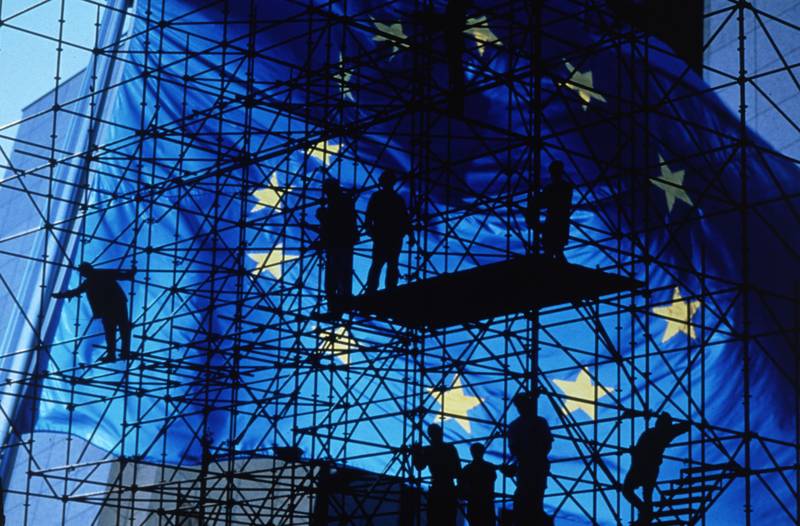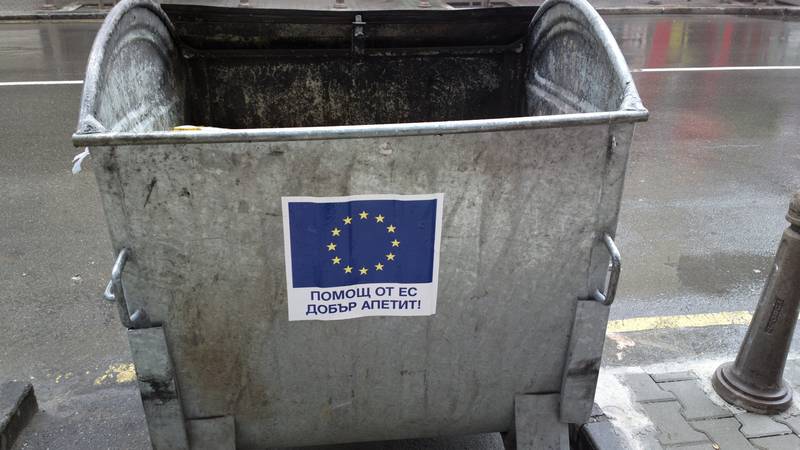Vision, Experience, Idealism or Youth?
Adelina Marini, May 5, 2014
April 28th, 2014, was a historic day. The European democracy was born on that day. In the evening of the 28th, the first debate took place [the attached video] between the candidates of the big European political families for the post of European Commission president. The debate was broadcast and moderated by euronews. The question, however, is how long will the European democracy live. Does a long and fully fledged life awaits it or is it going to die a little after May 25th when the EU leaders decide that their informal candidate is more appropriate than the one the EU citizens voted for? The debate has revealed several key weaknesses and piecemeal work in the European integration so far - a genuine political debate which, however, cannot reproduce the necessary result because the link between national and European is broken at some point.
The issues touched show the need of a real government, but the European Commission function as set in the Treaty is not that. There was criticism against political parties members of the European political families but the participants are just candidates who do not have the powers to expel parties or individual members. They lack the political means to perform political functions which they also will not have if elected, like, for instance, the question would they form a coalition with eurosceptics. Nonetheless, the debate, which took place before a big audience in Maastricht, a symbolic place where the treaty on the creation of the euro was signed, raised many fundamental questions about the construction of the EU which can be a perfect foundation for a debate on the reform of the EU treaties.
Besides, it puts the member states to a huge test because, to them, the European elections were just another national race. But the gauntlet has been thrown. People see that it is possible to have supranational politics. The main slogan of these elections is that this time it is different. Although, as a nominal result this is not true, in political terms it is very accurate.
The race was between the candidates of PES, EPP, ALDE and the Greens. The fifth candidate - Alexis Tsipras of the far left - did not accept the euronews's invitation. Martin Schulz, the candidate of the Socialists, declared a war against speculators and businesses that do not pay for internships, Jean-Claude Juncker (EPP) said he fought for a serious Europe not one that dreams. Guy Verhofstadt (ALDE) proposed a new Europe where the Commission will have a stronger role and will not be a function of the European Council, and on behalf of the Greens Ska Keller proposed a democratic and green Europe and social justice.
How did the nominees perform?
Guy Verhofstadt won a lot of applause with his concrete ideas and emerged as a visionary. He is known as a federalist, but he explained that he preferred not to be called one because it evokes associations of a super state. The former Belgian prime minister does not want that. He wants more common policies, integration of the energy, capital and digital market as well as completion of the internal market. According to him, the banking union will restore the broken mechanism between the economy and credit and with the creation of an energy community the energy prices will be reduced. More Europe, he believes, is a driver of growth. The problems with internal migration can be solved with a mobility scheme which guarantees people's mobility without using national social security systems, which the UK is most afraid of. This will the shut the mouths of parties like Britain's UKIP of Nigel Farage, the Liberal believes. Mr Verhofstadt continued passionately to defend the eurobonds, pointing out that without them there will be no exit from the crisis.
He does not believe that they will pose a moral risk which was highlighted as the biggest problem in the report of the expert group which the European Commission tasked to study the issue in-depth. If there were such a system it would ensure low interest rates for all and would serve as a pre-condition for the member states to reform. Guy Verhofstadt was most radical in terms of foreign policy and inter-institutional relations. On the question how will the candidates realise their promises since the Council has the final word, he said that if the Council imposed a candidate of their own, outside of those nominated by the parties, this will be the end of the European democracy after these elections. And regarding common foreign policy, Guy Verhofstadt said that without common defence policy foreign policy was impossible. This is an old idea which Europe needs to return to not by going against NATO but by being NATO's European pillar.
Ukraine's integrity must be maintained, but this will not happen unless Putin is driven out of the country. On behalf not only of Ukraine, but also of all those democratic movements in Russia, Putin should not be left to get away, was the Liberal's message. Sanctions must be imposed against Putin's entourage. Europe does not have the guts to do what the US does in terms of sanctions, he added.
Jean-Claude Juncker radiated his huge European and national experience during the debate. He was balanced on many of the issues, at some points he was a moderate populist, like on the issue about the powers of the European Commission chief. If he is elected he will continue to promote sound public finances and public debt reduction. The former prime minister of Luxembourg and Eurogroup chief is against tax dumping, which is why he defended the thesis of a European-wide minimum wage. As one of the people who proposed eurobonds four years ago, Juncker said that, still, the moment is not ripe for  them. First, certain pre-conditions must be met. Such as better and stronger coordination of policies, stronger control over the budgets of the member states.
them. First, certain pre-conditions must be met. Such as better and stronger coordination of policies, stronger control over the budgets of the member states.
It was not clear from his statement whether he believed the reform of the economic governance with which these pre-conditions are practically fulfilled (including the two-pack and the fiscal compact) were not sufficient in his view. In his capacity of a former premier and Eurogroup president Juncker defended the European Council recalling that it consists of representatives of governments elected by political parties who have representatives in the European Parliament as well. He refrained from entering the discourse about the inter-institutional war which has been going on in the past five years mainly between the European Parliament and the Council. His desire not to confront with the Council was obvious unlike Guy Verhofstadt who said that in the past five years it was the Council that managed the crisis and failed.
Just like Guy Verhofstadt, Juncker, too, maintains a single energy union, although the Belgian did not use this particular word. On the issue how capable he will be as Commission president to fulfil his promises given the functions of the post, Juncker responded vaguely saying that the real power was with voters. On the question about internal migration and euroscepticism Juncker, again, was balanced and moderate calling to differentiate between those who criticise, to a large extent justifiable, the European integration and those who are against it. He promised that he will not negotiate and will not make coalitions with extremist parties that do not share the European values. With this answer of his, he was retorted by Guy Verhofstadt who quoted a recent statement by Silvio Berlusconi about fascist Germany as well as his calls Italy to leave the euro area, reminded him of Viktor Orban, too, who "changes the Constitution every five minutes when he needs to be re-elected".
Juncker said he was doing precisely what he had and after the debate he wrote on Twitter that he managed to lose the support of only a few EPP parties. In fact, Guy Verhofstadt's criticism is justified, but he had to mention the black sheep in his own lines. A party which does not respect European values and put a young oligarch on its list, who provoked the most massive and continuous protests in Bulgaria in the country's most modern history, is part of the ALDE family - the Movement for Rights and Freedoms (DPS).
Jean-Claude Juncker was quite reserved also on the question about external migration saying the EU should not open the flood gates because it could not take all the misery of the world. Given the demographic trends it is clear that work is needed on improving the solidarity among the member states, he said and hinted of a change of the readmission programmes. Regarding foreign policy and Russia in particular, he entirely defended sanctions and dialogue. This is the only way to avoid war. Those who criticise the EU for being weak, in fact, want war, he said. EU is dependent digitally on the US and in terms of energy on Russia, the former premier of Luxembourg added and again propagated the development of the digital market and energy independence. This, however, excludes nuclear energy and shale gas. The problem can be resolved with better organisation of gas deliveries.
Martin Schulz seemed more cautious than usually and often resorted to populism. For instance, he said he did not want to speak about billions as if this was nothing while millions of people in Europe lived with 1,000 or 2,000 euros per month. To him, a number one priority is the fight against youth unemployment and it is on this issue that he articulated one of his few concrete proposals - the creation of a credit scheme for those who hire young people. Schulz also said that he generally was for a federal Europe and eurobonds, but reality suggested there was no majority for this in the EU today. To him, a great problem is what he called "self-empowerment" of the European Council which, he said, was incompatible with the European treaties. Whoever is elected European Commission president should receive a sustainable majority in the European Parliament because this is how the balance of powers can be changed.
The European Parliament chief shared a similar position with his opponents on the need of a new migration policy which all the 28 member states will contribute to and which includes protection for political refugees and temporary asylum for war refugees. This will be one of his first initiatives should he be elected president. He underscored many times that he wanted the next European Commission chief not to be the result of behind-the-scenes deals and called for an end to the model "success is national, failure is European". The German was very evasive in terms of Russia which provoked an exchange with Guy Verhofstadt who called Schulz "naive" because he believes that Europe should strive for a diplomatic solution.
Ska Keller is the youngest and most inexperienced of all the candidates, but she got a solid support from Martin Schulz. On the question of one of the moderators of the debate what would she offer on the table against the background of her experienced opponents, Martin Schulz sacrificed some of his time to react, saying that such a question was not fair. Proposals are what matter not age, he said. However, the lack of experience was evident very much in the German's performance. She often responded with general political phrases and slogans. According to her, the exit from the crisis is investments in green jobs, education and health care. According to her, debt should not be calculated only on the basis of budget deficit because a non-functioning education system was also a debt you leave to future generations. Instead of concrete ideas, Ska Keller decided to attack her experienced opponents. She  attacked Juncker for being, until recently, a premier of a tax haven which he denied. She attacked all that their political families voted for reducing the heading for energy efficiency in the EU budget.
attacked Juncker for being, until recently, a premier of a tax haven which he denied. She attacked all that their political families voted for reducing the heading for energy efficiency in the EU budget.
Her position on eurobonds remained unclear, but she, too, was of the opinion that it is a problem the Council to have too big a role in the decision-making. In the part about migration, Keller was very general and idealistic saying that it should not be forgotten that people do not flee out of good. She gave the example of Lebanon which has accepted, in her words, almost a million Syrian refugees given its own population of 4 million. In the EU, the Syrian refugees are only several tens of thousands. More can be done, she believes. A peaceful solution should be sought for Ukraine and the door for dialogue with Russia must remain open.
In the social networks the debate was a major issue on the evening of April 28th and it was obvious that a large part of the most active users were watching it. It raised several very important questions. Should candidates be party figures? After all, some of the questions the participants were asked were as if aimed at national politicians who have the whole party behind them with all its resources. Given that European political families consist of quite heterogeneous parties in terms of nationality, political culture and practises, defending political values proved too hard for the candidates. They were better in formulating their own visions. In this sense, it would be a good idea in the future to vote preferentially for candidates for the European Commission presidency - vote for one list of MEPs and if you do not like the candidate of the party this list belongs to, you should be able to vote for another candidate from another political family.
What does balance of powers in the EU depend on and is it along the line national vs European or it is purely inter-institutional? For most of the candidates it is a problem that the Council (the member states) have too much power, but Jean-Claude Juncker is right when saying that they, too, are democratically elected and represent national party interests. Moreover, whatever ideas the candidates have and whatever they propose as European Commission presidents they will have to ensure the approval of the governments and the European Parliament. How to resolve the conflict "success is national, failure is European", is another very important question which needs an answer. All these questions require serious discussion and possible opening of the treaties for reform. There are more debates to come, the biggest of which will be on May 15th and will be aired within the Eurovision network, thus it will be accessible for a much larger audience. It is important after the elections to be able to analyse sufficiently reliably whether and how many people voted for a certain political option only because of their candidate for the European Commission presidency.
 | © European Commission
| © European Commission | © euinside
| © euinside Angela Merkel | © Council of EU
Angela Merkel | © Council of EU